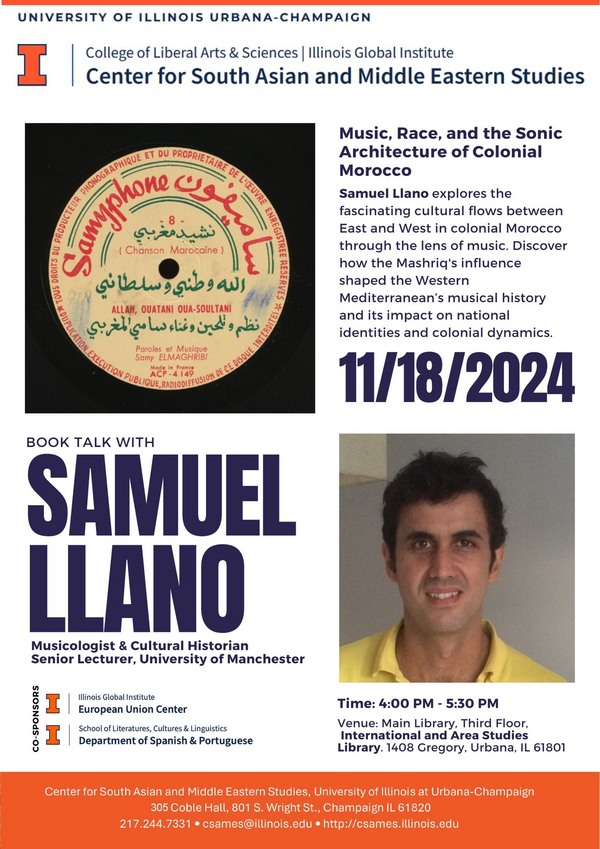
Dr. Samuel Llano's Book Talk: "Music, Race, and the Sonic Architecture of Colonial Morocco"
- Event Type
- Lecture
- Sponsor
- Center of South Asian and Middle Eastern Studies; European Union Center
- Location
- International Area Studies Library 1408 Gregory Dr. #321, Urbana, IL 61801
- Date
- Nov 18, 2024 4:00 - 5:30 pm
- Views
- 157
- Originating Calendar
- European Union Center Events
This paper will begin by outlining my current book project, which is scheduled for publication in 2025. Following this introduction, I will present and discuss a summary of one of the book’s chapters, entitled “The Music of the Mashriq and the Making of the Western Mediterranean”:
While Europe’s influence in the Maghreb is significant, the study of music in colonial Morocco often overlooks the impact of cultural flows between the East and West, which have been equally influential in shaping the region’s history. Historical accounts of Andalusi music, as found in the works of scholars from the Maghreb and Europe, consistently point to ninth-century Baghdad as one of the repertoire’s main focal points. Additionally, the debates in colonial Morocco and the Maghreb regarding the influence of Sharqi music and the involvement of European scholars further highlight the complex dynamics shaped by East-West cultural exchanges. Intersecting with these debates, Spain’s longstanding debates about the influence of Arab culture through al-Andalus, which permeated music scholarship, and France’s utilisation of exotic portrayals of “Spain’s” Muslim heritage, resulted in shifting and interconnected representations of the Mashriq – the eastern part of the Arab world.
To address this gap, this paper explores the intersecting and conflicting perceptions of the Mashriq that emerge from historical narratives of Andalusi music and discussions about the influence of contemporary Sharqi music in colonial Morocco. Further, it investigates whether the process of imagining the Mashriq and its music in Morocco, Spain and France fostered any forms of transnational solidarity, even within a context marked by colonial violence. Did these countries imagine the western Mediterranean as a cohesive and unified space? What was music’s role in shaping these perceptions? In what ways did imaginations of the western Mediterranean shape the national identities, musical cultures, and relationships between these countries? In this inquiry, the western Mediterranean is not treated as a fixed identity or stable category, but rather serves as an analytical framework.